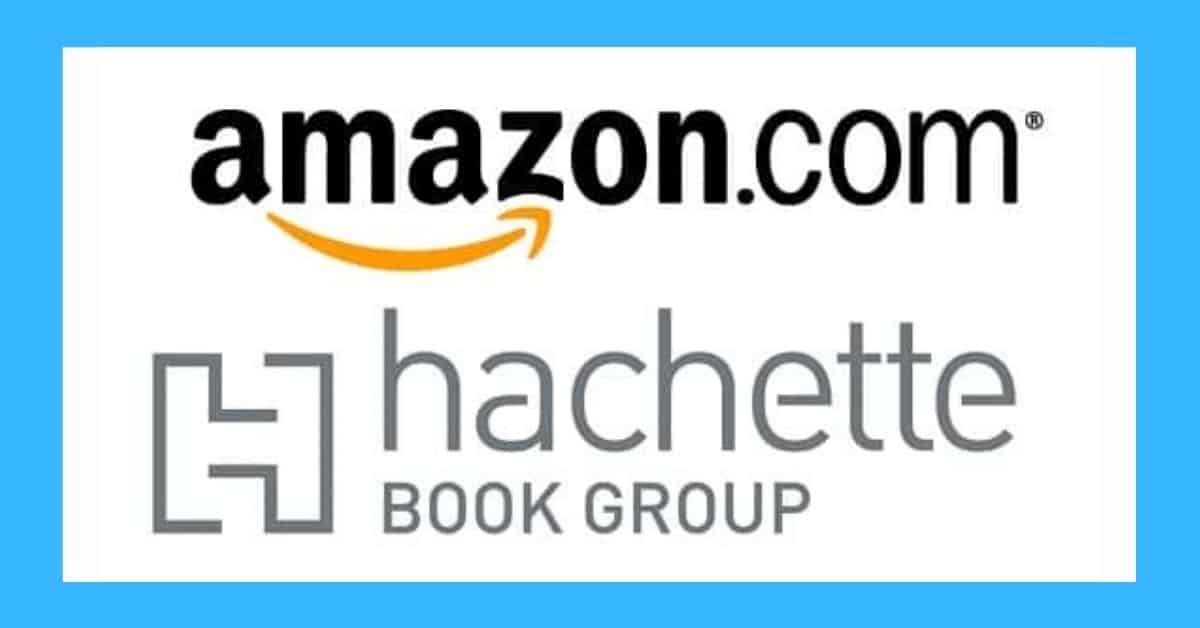The internet is seething over Amazon’s reported hardball tactics in negotiations with Hachette. Newspapers and blogs are filled with heated opinion pieces, decrying Amazon’s domination of the book business. Actual facts are thinner on the ground, however, and if history is any guide, we haven’t heard the full story. Here’s how it started.
This post is from 26 May 2014. It has not been updated except to clean up broken links but the comments remain open.
In a historical quirk of the trade, publishers and booksellers negotiate co-op deals at the same time as the general agreement to carry titles. (For those who don’t know, co-op is the industry term for preferred in-store placement, such as face-out instead of spine-out, position on end-caps, front tables, window displays, and so on.)
At publishers’ insistence, the same practice has continued in the online and e-book world, namely that negotiations regarding virtual co-op (e.g. high visibility spots on retailer sites) take place at the same time as discussions over general terms and publisher-retailer discounts.
There is a lot at stake in such negotiations – for both parties. Either side can lose millions and millions of dollars depending on what cost is agreed for co-op and what percentage discount off list price is agreed for the retailer. Negotiations can be particularly hard fought, as is often the case with large companies and huge sums of money. And the stakes are much higher since the price-fixing trial.
The Case Against Amazon
A friend of mine is published by Hachette. His latest came out this month so I’ve been aware of this dispute for while. We noticed some strange things happening with his Hachette book pages on Amazon – stuff that only appeared to be affecting his Hachette titles. A quick check confirmed that all Hachette books seemed to be affected, and, indeed, only Hachette books. At this point, Hachette hadn’t started contacting its authors or briefing the media, but it was clear there was some dispute between it and Amazon.
First, Amazon began displaying competing titles in a bar across the top of Hachette’s books’ pages. No doubt this exercise was intended to show the value of Amazon’s real estate. Next it was reported that Amazon had become inexplicably slow at fulfilling orders of Hachette books. Following that, it was claimed that Amazon had removed Hachette books from sale altogether.
The latter claim turned out to be overblown. Amazon has removed the purchase button from Hachette pre-orders and replaced it with a sign-up for a news alert when the book is orderable.
Pre-orders are a facility that Amazon extends to certain publishers. Except for the very biggest sellers, self-publishers don’t have access to this facility – probably because Amazon has (reasonable) doubts as to whether self-publishers en masse could deliver without issues. After all, Amazon is the customer-facing entity in the chain, the one that will be the target of the reader’s ire if the book is delayed.
And there are delays in the Amazon-Hachette connection right now. That much is clear. But who’s at fault? Hachette author Michael Sullivan revealed last week that there appears to be delays on both sides.
On April 29th, during a phone call with Amazon’s Author Central, the Amazon representative indicated they had more than a dozen purchase orders placed from April 21st – 24th which had not yet shipped. At that time, Hachette was indicating ship dates of May 2nd – May 10th. Hachette has continually assured us all orders were shipping “in a timely manner” and Amazon was to blame for placing small orders. We’ve asked for copies of the purchase orders and confirmation of the shipment dates from my publisher but have been told, “It is not information we would like to be shared with any third party at the current time.” Hachette would be foolish to delay orders while simultaneously accusing Amazon of doing exactly that, but perhaps their definition of “in a timely manner” is not the same as it was before the dispute.
It’s possible that Amazon is strong-arming Hachette. But it’s also possible that Amazon has removed the pre-order facility because it doesn’t currently have confidence that Hachette can deliver books on time. The simple fact is that we don’t know.
The dispute could center on any number of issues. It could be that Amazon is seeking huge percentage discounts which are making Hachette blanche. Or maybe the price of Amazon’s co-op has increased (fairly or unfairly) and Hachette is unwilling to pay. Or perhaps Hachette wishes to sell e-books under an agency-type model and retain control of retail pricing, and Amazon wants to sell Hachette’s e-books under a wholesale model and be free to discount at will. It might simply be the case that they are poles apart on the exact levels that Amazon will be permitted to discount.
We don’t know. And if we don’t know the exact nature of the dispute, we can’t pronounce judgments as to whether Amazon is being unfair or using their market power in anti-competitive ways. If the latter is true, Hachette has a remedy open to it: the courts.
Picking A Fight
But why Hachette and why now? The large publishers who were found to have illegally colluded with Apple to fix ebook prices are all currently subject to a court order to renegotiate their agreements with retailers. Hachette is one of those publishers.
To prevent the parties illegally acting in concert once more, Judge Cote ordered that retailer-publisher negotiations be staggered. Hachette is first up. It’s that simple.
Hachette is being portrayed as some helpless fawn. Several articles have speculated that Amazon is “going after” Hachette first because, compared to the rest of the large publishers, Hachette is small and weak.
Don’t buy it. Hachette might be the smallest of the “Big 5” on paper, but that’s only when you look at the American market. Hachette Book Group is owned by Lagardère Publishing – the biggest publisher in France and the second biggest in the UK. It has significant publishing interests across the rest of the world too, enough to make it the world’s second largest trade publisher overall.
Lagardère Publishing is itself part of Lagardère Group, a giant worldwide media company – magazines, radio, television, online, digital, and books – with annual revenue of approximately $10bn dollars.
Not so small anymore… which gets me thinking. I’m always skeptical when a story with precious few facts is reported in an uncritical and uniform way.
It’s almost like it’s the result of a very smart PR campaign. It’s almost like Hachette is part of a giant mass media conglomeration with billions of dollars of revenue and hundreds of outlets in which to push its message. It’s almost like Hachette is part of an international publishers’ association which has explicitly stated it will be flooding the media this year with stories intended to advance its interests.
If you doubt the ability of a PR campaign to radically shift attitudes and perceptions, I must point you towards the history of diamond engagement rings and the sudden shift in popularity of smoking among women. And if you want an example of journalists chasing each other’s tails and not bothering to check the facts of a hot story being reported by competitors, I urge you to read the post I wrote in January revealing that Hitler’s Mein Kampf was never a digital bestseller… until the media made it one with their inaccurate reporting.
Hachette isn’t the only large publisher with a vested interest in the current dispute. As mentioned above, the court mandated settlement in the price-fixing case set out a schedule by which publishers would renegotiate their deals with retailers. Penguin Random House, Simon & Schuster, Macmillan, and HarperCollins will all have to go through the same process – all staggered six months apart. All of them will be watching the outcome of Hachette’s negotiations closely. All of them are rooting for Hachette to “win.”
Who Owns The Media?
Publishers like to portray themselves as plucky little companies doing their best in a world dominated by heartless giants like Amazon. It’s good PR, but it’s far from true. I’ve covered Hachette’s media links above, but here are the rest:
- Simon & Schuster is owned by CBS Corp. which has revenue of over $14bn. CBS owns the most watched network in the US and its operations cover every field of media including cable, publishing, radio, and local TV.
- Penguin Random House is owned by two companies, Bertelsmann with a 51% share and Pearson a 49% share. Until 2003, Pearson owned the RTL Group – the largest commercial television and radio broadcaster in the EU – at which point it was sold to Bertelsmann, which still own the company. Bertelsmann is a giant media company with revenues of around $20bn and interests in more than 200 media companies worldwide, including 54 television stations, 29 radio stations, and the largest magazine publisher in Europe.
- Macmillan is the odd one out as its corporate parent (the Georg von Holtzbrinck Publishing Group) doesn’t have global media interests worth mentioning, aside from 50% of Die Ziet – the most widely read German weekly paper with an estimated readership of over 2 million.
- But HarperCollins picks up the slack by being a subsidiary of the media behemoth that is News Corp. – which owns huge chunks of the media market all across the world, including the US (Fox, the New York Post, the Wall Street Journal) and the UK (Sky, the Times, The Sun).
Suffice to say that it’s pretty easy for large publishers to get their message heard, and that’s without including the army of blogging authors and agents who often gravitate towards the same positions, as well as the horde of newspaper columnists desperate for a book deal.
Big Media Push
The last time I saw an anti-Amazon media push this big was in the run-up to the price-fixing trial. It seemed pretty clear to me that the large publishers were attempting to litigate the case in the court of public opinion because they had no chance in an actual court.
Don’t you think it’s interesting that a very similar spat between Barnes & Noble and Simon & Schuster generated little of the same negative attention? Authors like Hugh Howey had virtually zero B&N bookstore distribution (for the release of one of the hottest titles of the year), and this was accompanied by no widespread condemnation, just a general hope that both parties would amicably resolve their dispute.
By contrast, Amazon was universally painted as a bully when it removed Macmillan’s buy buttons in a comparable spat in 2010. And we now know that, at the time, Macmillan was part of an illegal conspiracy to force the Agency Agreement on Amazon and artificially inflate the price of e-books (along with Hachette).
That history should caution everyone before leaping to judgment this time, but huge corporations spend millions on PR because they know that if you repeat the same message over and over, people will begin to believe it – regardless of the facts.
While I hope that the dispute gets resolved quickly – for the sake of the authors affected – I’m keeping an open mind as to who’s really at fault here.
Given Hachette’s history, I recommend doing the same.

